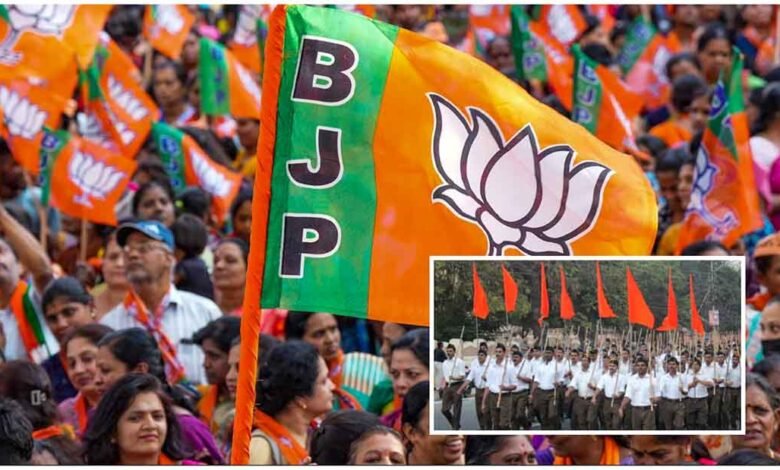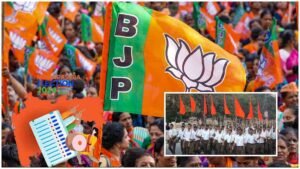RSS’s Master Plan Leads BJP to a Historic Victory in Maharashtra Assembly Elections
How RSS's Micro-Planning and Ground Strategy Secured BJP's Record Win in Maharashtra

The RSS’s Strategic Role in BJP’s Victory
In a historic outcome, the Bharatiya Janata Party (BJP) achieved a resounding victory in the Maharashtra Assembly elections, with the Mahayuti alliance, led by the BJP, winning 235 out of 288 seats. This success has been attributed to the meticulous ground-level planning orchestrated by the Rashtriya Swayamsevak Sangh (RSS). Many political analysts and experts are acknowledging the key role played by the RSS in this electoral triumph, which has shocked opponents and surprised many voters in the state.
The Power of Micro-Planning: RSS’s Secret to Success
The success story of the BJP in Maharashtra is closely tied to the strategic micro-planning conducted by the RSS. Utilizing their extensive organizational network, the RSS mobilized more than 65 allied organizations across the state. Corner meetings were held at over 350 locations, allowing the RSS to gather critical feedback and gauge the sentiments of local communities. This micro-planning enabled the BJP to tailor its campaign to the specific needs and concerns of each region, making it a winning strategy.

BJP’s Lessons from Past Elections
The relationship between the BJP and the RSS has not always been seamless. In previous Lok Sabha and state elections, some BJP leaders had publicly stated that the party no longer needed the support of the RSS for electoral victories. This caused a rift between the two organizations, leading to underwhelming results for the BJP in those elections. However, learning from these past experiences, the BJP realigned its strategy and sought the RSS’s support, leading to the Grand Alliance’s unprecedented success in the Maharashtra Assembly elections.
Corner Meetings and Ground-Level Campaigns: A Winning Formula
A major component of the RSS’s strategy was its emphasis on corner meetings at the grassroots level. These meetings, held in small groups across the state, focused on understanding the unique social and political challenges of each locality. Sangh Swayamsevaks—RSS volunteers—engaged directly with local communities, discussing issues ranging from national consciousness and Hindutva to development, good governance, and public welfare.
By avoiding direct appeals to vote for the BJP, the RSS instead encouraged people to support candidates who aligned with their ideology and values. This subtle yet effective approach capitalized on the trust that people have in the RSS, ensuring that the BJP’s message resonated deeply without appearing overly partisan.
Key Issues Addressed by RSS: Building Trust at the Grassroots
During the campaign, RSS volunteers emphasized a range of key issues that they knew would appeal to the electorate:
- National Consciousness and National Interest: The importance of national security and unity was a consistent theme in RSS-led discussions.
- Hindutva Ideology: Volunteers emphasized cultural and traditional values, resonating with a large portion of the electorate.
- Good Governance and Development: The promise of effective governance, development projects, and infrastructure improvements formed a core part of the narrative.
- Social Welfare and Local Development: The RSS’s emphasis on local development projects, community welfare, and a united society struck a chord with voters across Maharashtra.
Analysis of the Election Results: Mahayuti’s Dominance
The outcome of the election demonstrated the effectiveness of the RSS’s approach. The Mahayuti coalition, led by the BJP, achieved a record victory with 235 seats, leaving the Congress-Uddhav Thackeray’s Shiv Sena alliance, known as the Mahavikas Aghadi, trailing far behind with just 46 seats. This result underscores the significant shift in Maharashtra’s political landscape, driven by the RSS’s grassroots mobilization.
The Strength of the Sangh’s Credibility
The credibility and long-standing presence of the RSS in Maharashtra played a crucial role in the electoral campaign. By emphasizing local and national issues without overtly politicizing the message, the RSS was able to mobilize communities that had previously been hesitant to support the BJP. This approach, built on trust and local engagement, was a masterstroke that contributed to the Mahayuti’s decisive victory.
A Political Lesson for the Opposition
The Maharashtra election results have sent a strong message to the opposition parties. The BJP’s victory, backed by the strategic efforts of the RSS, highlights the importance of grassroots engagement and tailored campaigning. The Congress-Uddhav Thackeray alliance now faces the challenge of rethinking their strategy if they wish to regain political relevance in the state. For the BJP and RSS, this victory serves as validation of their combined strategy, and it is likely to shape their future campaigns across India.




